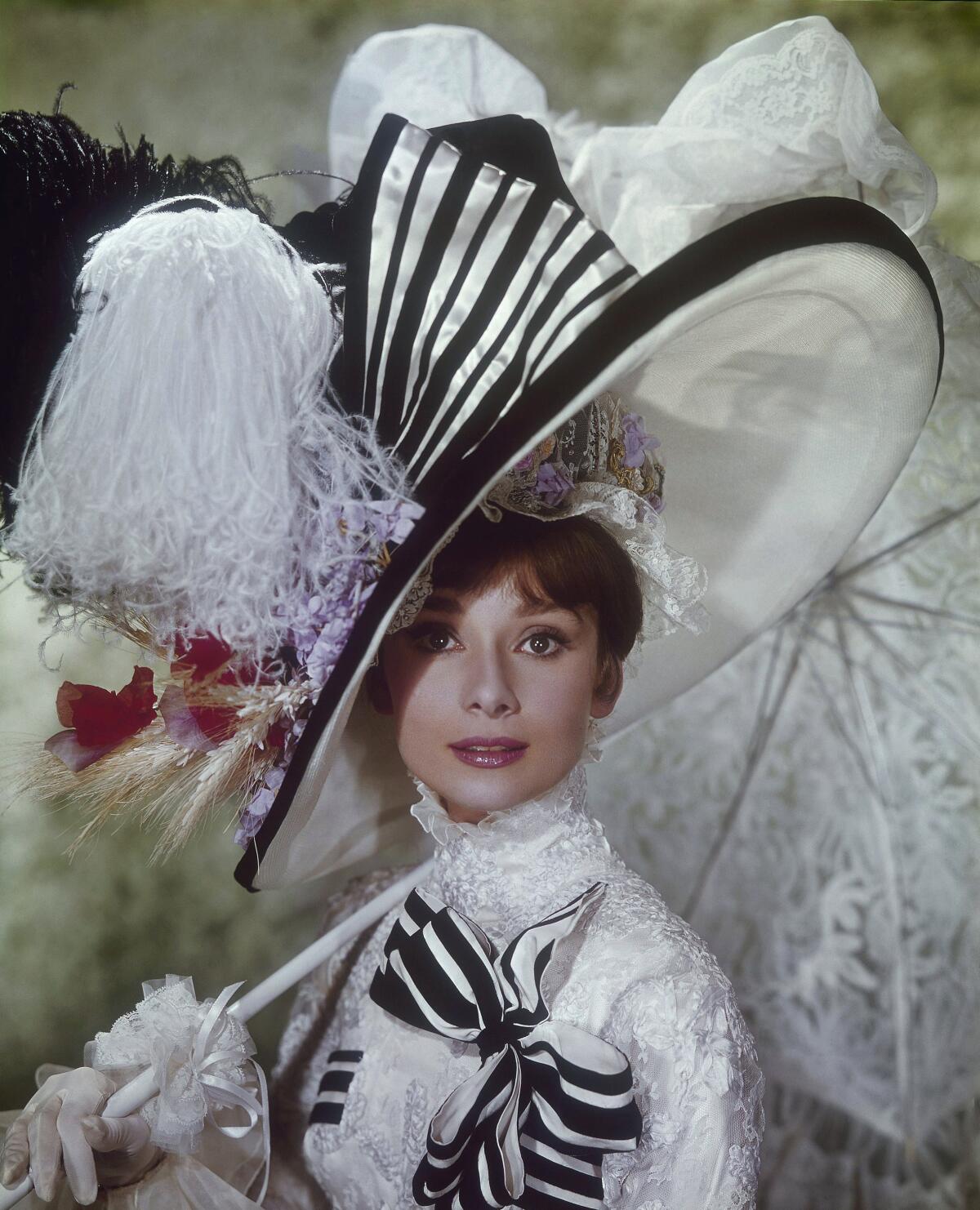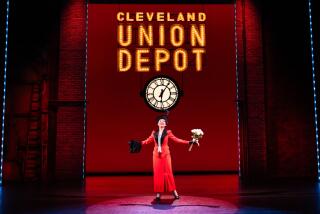From the Archives: ‘Fair Lady’ movie is a total triumph

NEW YORK — Following some beautifully flowered titles, “My Fair Lady” went into the opening action in Covent Garden as raucously as the stage play does, and I had some misgivings about it since all this seemed even more hopped up in stereophonic sound than in person. But after a few more sequences I told myself that this $17 million movie decidedly deserves a yes verdict.
Then, later still — I think it was the expression of touchingly desperate defiance on the face of Audrey Hepburn as she finally enunciated “The Rain in Spain Stays Mainly in the Plain” — my estimation jumped to “great.” And when the curtains came together at the finish of just three hours, three hours of Technicolored enchantment, I heard myself all but echoing Col. Pickering’s proud summation of Eliza Doolittle’s performance as a duchess at the Embassy Ball, “a total triumph.”
The gala world premiere of “My Fair Lady” took place Wednesday night at the Criterion Theater here — just one week ahead of the Egyptian in Hollywood. Most of the principals involved were in attendance. The audience’s verdict must have been much like mine, for this is a version that makes it possible for all to see more, hear more and find new delights in the nuances of character than at a routine performance on the stage.
Delicate direction
Also, in the delicacy of George Cukor’s direction and the playing of Miss Hepburn as Eliza and Rex Harrison as Prof. Higgins, I felt a more cutting poignancy, something closer to the original “Pygmalion,” than in the theater. There is real profundity in this eternal conflict of the man-woman relationship, and this pair have illuminated it so brilliantly that I am tempted to say it would stand up even without the endlessly inventive Lerner and Loewe score. But that is a sophistry; it already has stood up, of course, in Shaw’s play.
Actually, it still astonishes one to realize how tightly these songs — more than a dozen of them — are welded to the core of the narrative; and there rarely, if ever, happens to be a false-sounding word or phrase. They’re all here, those songs, two or three — like “I Could Have Danced All Night” and “Poor Professor Higgins” — seemingly further embellished. I did think “With a Little Bit o’ Luck” went on too long, but that other jolly roundelay of Stanley Holloway as the roistering Alfred Doolittle, “Get Me to the Church on Time,” comes off as a marvel of conception and execution. Then there are the melodious and moving “On the Street Where You Live,” “Wouldn’t It Be Loverly?” and, especially, “I’ve Grown Accustomed to Her Face” — the professor’s final, rueful capitulation to the loveliness of the scatter-brained guttersnipe he has transformed into a lady. And the more spirited “Just You Wait, ’Enry ’Iggins,” “Rain in Spain,” “You Did It,” “Without You” and “Show Me.”
Triumphant entrances
Harrison, already immortal in his part, has added to it, if anything, that extra dimension I mentioned. And he is matched by Miss Hepburn in the acting — her two triumphant entrances, got up at last as the great lady, eliciting gasps of admiration for their beauty alone.
She is unquestionably as superb in her way as Julie Andrews was in hers, but more elfin and hence more pitiable. There may still be disappointment and resentment over producer Jack L. Warner’s final choice — but it’s made now. Also, of course, Miss Hepburn’s singing has been dubbed, mostly by Marni Nixon. The lip-matching is just about perfect. The other standouts are Wilfrid Hyde-White as Col. Pickering, Holloway and Theodore Bikel as the linguistic expert — plus Jeremy Brett, Gladys Cooper and Mona Washbourne.
Design of the production by Cecil Beaton, as photographed by Harry Stradling, reaches a new height in magnificence. Art director was Gene Allen. Frederick Loewe is credited for additional music (presumably mostly bridges), and Andre Previn for supervising and conducting it. The choreography is by Hermes Pan.
If a musical movie has ever been presold, this is it. But it is still wonderful to be able to report that the buyer need not beware.
More to Read
Only good movies
Get the Indie Focus newsletter, Mark Olsen's weekly guide to the world of cinema.
You may occasionally receive promotional content from the Los Angeles Times.










